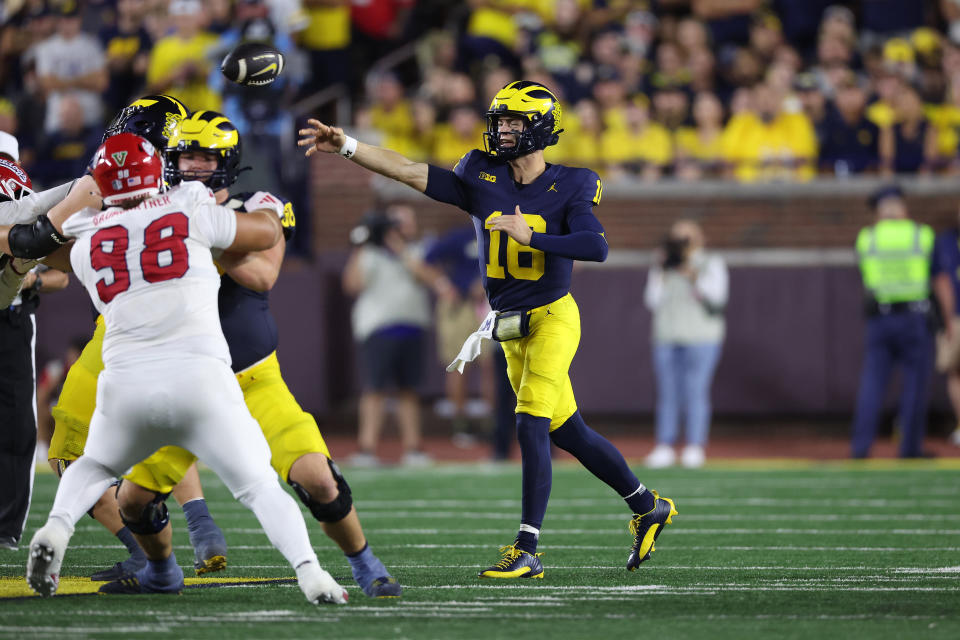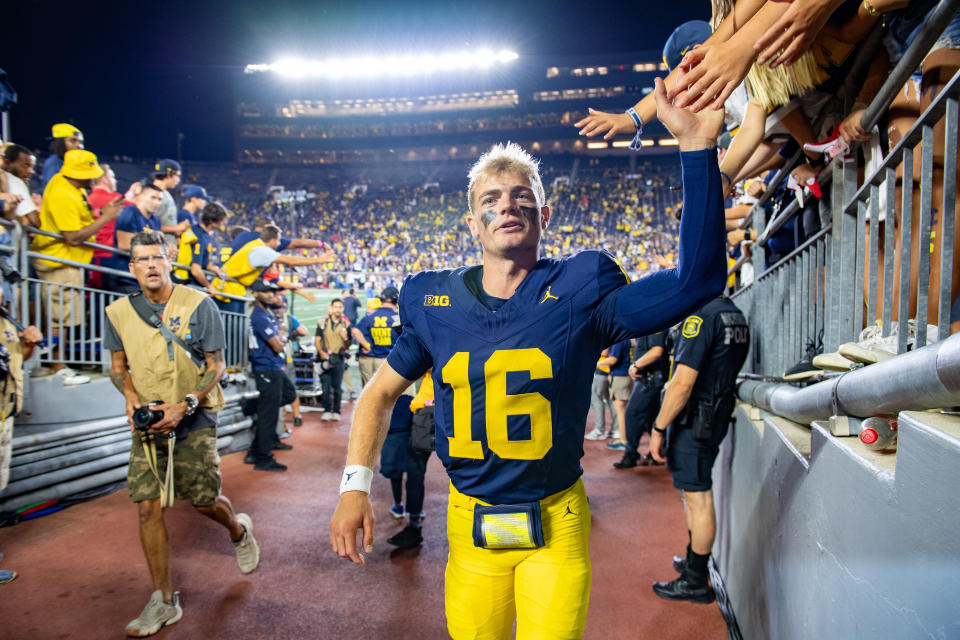It was spring 2019, and Davis Warren, 15, a high school quarterback from Los Angeles, sat down on the bench press to begin a 6 a.m. weightlifting session.
He couldn’t finish a single warm-up rep with the 135-pound bar.
“I felt dizzy, lightheaded,” Warren said on the LAB with Jake Butt podcast last month. “I knew something wasn’t right.”
Warren and his parents were at a local hospital when doctors told them Warren had acute myeloid leukemia. The five-year survival rate for children is only 66 percent (and only 29.5 percent for adults). Warren sat stunned. The conversation revolved around treatments, challenges, side effects, etc. His first thought was that he was about to die.
“You never expect that to happen to you,” Warren said this week.
However, a question occurred to him.
“When can I play football again?”
The disease and the survival rate were terrifying, but the treatment was relatively short: five to eight months. So, technically, he could play that coming fall — at least if everything, absolutely everything, went well and he still wanted to, the doctor said.
Five years later, Warren is expected to start Saturday for the reigning national champion Michigan Wolverines, who will host third-ranked Texas. On the other side of the field will be Longhorn star quarterback Quinn Ewers, backed up by Arch Manning, both former top-ranked recruits and potential first-round NFL draft picks.
Warren’s journey from the children’s cancer ward to the 110,000-seat Big House in Ann Arbor won’t earn him an extra yard or Michigan an extra point, but it’s the kind of improbable, inspiring story (even in the professionalized NIL era) that makes college sports so special.
Warren beat leukemia and played football in high school. his The plan was to stick to his schedule, even though he lost his hair and at least 40 pounds. He did so without ever losing faith during a four-and-a-half-month hospital stay that included walking laps around the facility and even playing catch with his father in a green space.
“The best medicine, obviously, is every doctor has their own specialty… but a little bit of sweat, a little bit of a smile, getting your heart rate up safely? That’s priceless,” Warren said.
Warren said he weighed between 155 and 160 pounds when he returned to play midway through his junior season. Understandably, he was fine — a far cry from a top college prospect. He had to undergo weekly blood tests to be able to play. One week, his platelets got too low and he couldn’t play. Frustrated, he had heard that papaya juice could help, so he ordered an extract online and drank it all week.
“It tasted disgusting,” he told MLive.com.
Maybe it worked and he got his platelet count up for the next game. He completed five of six passes.
Warren was an undeniable success in life. He was already inspiring other children with leukemia and trying to connect with patients around the world who needed a little hope that better, normal days were possible.
Still, he wanted to play in college, so in 2020 he transferred to powerhouse Suffield Academy in Connecticut for his senior year to get better exposure to scouts. Instead, the entire season was canceled due to the COVID-19 pandemic. Options were limited.
However, Suffield’s coaches had developed enough Division I players to recognize Warren’s potential in the few practices they had held. They began reaching out to colleges they knew, which led to then-Michigan head coach Jim Harbaugh calling and offering Warren a chance to play in Ann Arbor.
Warren went for it and never looked back. There was no scholarship, but there was a chance. He may have been last in the standings, but at least he was on it. He’s always conscious of that survival rate.
“How many children don’t have the opportunity to tell the story I’m telling?” he asked.
As a freshman, he became known around the program for his long hours studying film, often side-by-side with then-starter Cade McNamara, despite knowing there was almost no chance he would play. Instead, he focused on helping the defense prepare and was named “Scout Team Player of the Year.” He spent seemingly every free moment at Mott Children’s Hospital, which is on Michigan’s campus, visiting children with cancer like he once did.

“(He’d say), ‘Hey coach, there’s a kid from Mott Children’s Hospital who wants to come practice,’” said Sherrone Moore, Michigan’s current head coach and offensive coordinator at the time. “(I’d say), ‘Yeah, don’t ask me again, just bring them.’”
In his second year at Michigan, Warren appeared in five games, completing 5 of 9 passes. It was a mop-up job, but so what? His mere presence on the field was an epic and emotional accomplishment. Last year, in 2023, he appeared in three games. He threw five passes. Only one was caught by the other team for an interception.
Michigan entered the 2024 season with a battle at quarterback, and while Warren’s name was mentioned often, there was little expectation that he would emerge as a starter. Most thought it would be Alex Orji, a powerful running back, or perhaps Jack Tuttle, a veteran who transferred from Indiana.
However, don’t underestimate a cancer survivor.
“Alex and I talked about knowing your ‘why.’ Why are you doing this?” Warren said of Orji. “My journey, what I’ve been through, how I got to Michigan, I know what my ‘why’ is: kids in children’s hospitals battling cancer every day…
“That’s my X factor,” he continued. “Fuck the tiredness. Fuck whatever. There are people going through a lot worse than this; I’ve been through a lot worse than this. And when I was in that moment, in that hospital room, dealing with that, all I wanted to do was get back out there, be healthy, and do the things I love to do.”
When the Wolverines opened the season last Saturday against Fresno State, it was Warren who started, completing 15 of 25 passes for 118 yards and a touchdown.
“We’re talking about a fighter,” Moore said. “He had cancer. Senior year was canceled because of COVID. He came here as a non-scholarship player. He’s been a third-string player since he got here. Every week, the coaches test him, he always got a 100 on his test. He always took notes. He always did the right thing.”
Orji also played nine snaps at quarterback against Fresno. Both are expected to play against Texas. Moore noted that perhaps the best illustration of who Warren is came after Orji threw a touchdown pass. It was Warren who ran over to be one of the first to congratulate the man who is, in essence, his competition for playing time.
“Selfless,” Moore said. “A phenomenal teammate.”
Texas is a 7.5-point favorite this weekend, despite playing on the road, and the disparity at quarterback is a big reason. That doesn’t matter to Davis Warren. From hospital beds to papaya juice to the scouting team, he’s long since overcome longer odds than that.
“I tell kids all the time who are going through this, kids who are missing school or feeling like they’re behind in their lives, ‘Hey, this is going to make you 10 times stronger, 10 times tougher, 10 times more resilient, 10 times happier,’” Warren said.
“I don’t wake up and feel like I’m having a bad day.”
Especially on Saturday.

